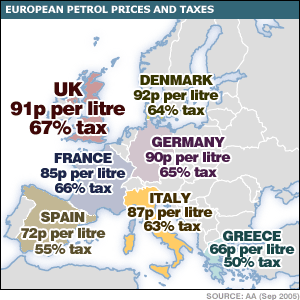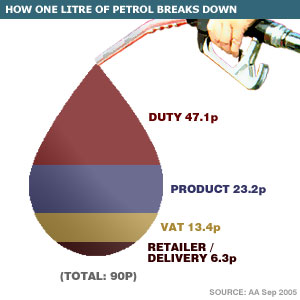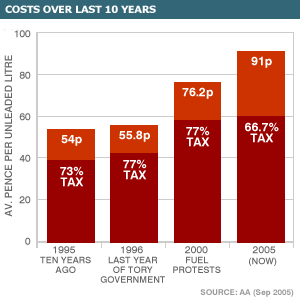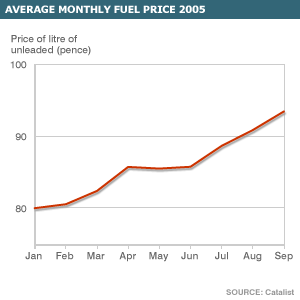Wednesday, September 14, 2005
In the past few days, I have been anticipating a new round of fuel protests. Today & yesterday the effects started to appear. Panic buying of petrol, by drivers ensured that petrol stations have begun to run out of petrol. Many are restricting purchases to a maximum of £10. Walking back from the shop yesterday past my local Morrisons supermarket I was amazed to see a line of cars reaching all round the supermarket car park queueing to get petrol & diesel.
 See the queues as motorists panic buy across the UK - BBC
See the queues as motorists panic buy across the UK - BBCDownload & Watch - asf
Outnumbered by police and journalists, angry hauliers and farmers gathered at oil refineries across Britain this morning, but failed to cause the disruption to fuel deliveries that led to the panic-buying of fuel across the country yesterday. Petrol retailers expressed hope that the limited nature of the protest would bring to an end the rush on the pumps which caused around 3,000 service stations to run dry yesterday.
Despite the low turnout, protest organisers claimed success this morning, insisting that it was never their intention to blockade fuel tankers and interrupt petrol supplies. Andrew Spence, of the People’s Fuel Lobby, joined around a dozen supporters at the Shell storage facility in Jarrow, south Tyneside, at 6am. As dawn broke, and tankers drove unhindered in and out of the complex, he said he had not planned a mass protest.
"We didn’t want a lot of people here, I would rather there was just a handful of us," he said, claiming that the increased media attention in recent days had done enough to highlight the recent increase in petrol prices. "If we hadn’t basically said that we would be returning to the refineries, the media wouldn’t have highlighted the issue as it has done. I doubt that the Government would have given us the 1.2p freeze in duty proposed for October. I like to think that we have achieved something this week," Mr Spence told BBC Radio 4's Today programme.
 The forces fuelling petrol prices explained - BBC
The forces fuelling petrol prices explained - BBCDownload & Watch - asf
Shell said it was "aware of a very small number of protesters" outside its facility but said that petrol deliveries were running according to schedule. "All our operations are running normally," a spokesperson said. Asda, which operates around 140 service stations, said that sales had returned to normal levels this morning and that all its stations that suffered a rush on the pumps yesterday had been restocked.
"It's back to business as normal this morning," said a spokesman. "The protests were a bit of a damp squib and we hate to say we told you so, but we've told customers all week that there is plenty of fuel in the system and no reason to buy more than they need." "Our advice to customers is that if you see a queue, don't feel the need to join it."
Chris Hunt, director general of the UK Petroleum Industry Association, also played down the importance of this morning's protests and the consternation they have caused in recent days. "So far the protests are fairly low-key, and they are peaceful and there have been no attempts to block our tankers as they come out of terminals," Mr Hunt told the BBC. "The panic buying tends to be a blip. Once you’ve filled your tank you can’t fill it up again."
 The Chancellor Gordon Brown's comments on fuel prices - BBC
The Chancellor Gordon Brown's comments on fuel prices - BBCDownload & Watch - asf
Ray Holloway, of the Petrol Retailers Association, said the poor attendance at the protests was predictable and hoped it would finally convince motorists to stop stockpiling fuel. Some garages took advantage of the panic-buying to raise prices to well over £1 a litre yesterday. "We have had six days of fuel bought in just two. It is crazy," said Mr Holloway. "Motorists simply must accept that there is going to be no disruption to their petrol and diesel supplies."
A steady stream of tankers pulled in and out of refineries across the country, including the Kingsbury Oil Terminal, Britain's largest inland facility, in north Warwickshire. One truck did park outside the entrance, causing ripples of excitement among the gathered journalists, but it turned out to be a Hungarian lorry that had got lost.
There was no sign of protesters outside the Coryton refinery, Essex, although there were a handful of demonstrators gathered at a plant in Purfleet, about 15 miles away. Hauliers held placards saying "Support British Hauliers" and "End Labour’s War on the Motorist". "It is disappointing," said James Hart, a lorry driver protesting at Purfleet. "I think the problem is people can’t afford to take time off work. I’m not sure what we’re going to do now."
 Hear the views of motorists as they queue to buy petrol - BBC
Hear the views of motorists as they queue to buy petrol - BBCDownload & Watch - asf
Both the Texaco refinery in Pembroke and the Total refinery in Milford Haven, Wales, blockaded by protesters five years ago, were also quiet. At Fawley, in Hampshire, the few protesters who arrived at 6am left soon afterwards, embarrassed by the scant numbers. The scenes were repeated at Shell's Stanlow refinery in Ellesmere Port, Cheshire and Avonmouth Docks near Bristol. In Scotland, police stood with protesters at BP's Grangemouth refinery and promised fuel deliveries would not be blocked.
Gordon Brown, the Chancellor, has resisted calls to reduce the tax on fuel and yesterday told TUC delegates in Brighton that an "international plan"was needed to encourage Open to invest and stabilise its supplies. David Frost, director-general of the British Chambers of Commerce, said: "There is not anything like the support that there was five years ago for the protesters. Then there was a feeling that it was the government ramping up these prices. Now there is an understanding that it is a worldwide issue."
Sources - BBC & The Times Newspaper
Charlie
hewitt.mobi Posted at 4:32 pm |
4 comments
Gads! That sounds horribly chaotic.
Oh!
Hi Michelle,
By hewitt.mobi, at
1:54 pm
No problemo.
4 Comments:
Glad to report that gas prices in USA are decreasing. I wish I knew the conversion of dollars to pounds...but we've seen enough of a decrease to quell any panic buying. It NEVER got as bad here as it seems to be where you live. Why is the panic settling in NOW? Is this considered a domino effect?
The taxes on your gas is incredible. Someone told me that the high tax funded the healthcare system ...is that true?
Hopefully, the panic will abate and rational thinking will prevail..we can only hope.
I checked out Morrisons.
What fun ...
The most amazing thing I saw was that they hang their bananas! Sounds silly perhaps to focus on that...but in every store here, they just place them on a display case. Nothing special at all.
Hanging bananas are so cool. I mean, we do that with them once we get them HOME, but they are not sold that way. I love to see differences with items that are considered "ordinary" in daily life, but are made extraordinary by such a simple change.
What do you think of that?
Yeah it's pretty crazy, people doing that but that's just humans isn't it. The thing with the banana's that made me laugh....Yes it's a bit strange that they sell them hanging up. None of the other supermarkets do that.
Our free at the point of demand healthcare system is partly funded by the petrol duty, but mostly through income tax which is also a lot higher than where you are. But having said that we have one of the best social welfare systems in the world so things are not all that bad. Thank's for dropping by again.
Charlie xxx
Always interesting.
Gee, the bananas are only like that at that one kind of store? Darn, I thought maybe is was a country difference...:-)
Like I mentioned on my blog, I don't usually do anything religious , one way or the other. It was just that the author wrote it from the perspective of an "expert" in said religion and as such was perpetrating the myth. I wouldn't be a responsible practitioner if I kept silent.
Other than that...I do not voice my opinions in that regard..there are WAY too many other people out there that do that...and are much better at it. Give me books, jokes,fluff and brighter subjects that counterbalance the everyday stresses of reality that we deal with every day.
Judging from your by-line, you are trying to make sense out of life. A Challenging goal.
The hardest pursuit in that,(in my humble opinion) is doing it with a sense of humor. I said it somewhere...now I don't remember where...but "It's easy to be serious, harder to be funny"
I can only try.
TTFN!!






